 |
Dr Emily Carey Project title: ‘Postoperative Haematinics in Bariatric Surgery Patients: Comparing Procedure Type, Iron Deficiency, and Weight Loss Patterns’. Academic track project supervisors: Professor Helen Heneghan, Consultant Bariatric and Upper GI Surgeon, National Bariatric Centre, St Vincent’s University Hospital. Project summary: This project investigates postoperative iron dynamics in patients undergoing bariatric surgery, focusing on how procedure type, inflammation, and weight loss interact to influence iron handling and recovery. Bariatric procedures such as Roux-en-Y gastric bypass (RYGB) and sleeve gastrectomy (SG) achieve substantial and sustained weight loss but alter gastrointestinal anatomy and nutrient absorption, increasing the risk of iron deficiency and anaemia. Building on previous work examining preoperative iron deficiency patterns in over 1,000 bariatric surgery candidates, this study compares postoperative iron studies, inflammatory markers, and weight loss outcomes to identify differences between surgical approaches. By analysing these factors together, it aims to clarify mechanisms of postoperative iron deficiency and determine which patients are most likely to benefit from tailored supplementation and follow-up strategies. The findings will contribute to optimising postoperative nutritional care, improving patient outcomes, and informing evidence-based guidelines for the management of iron deficiency following bariatric surgery. |
|---|---|
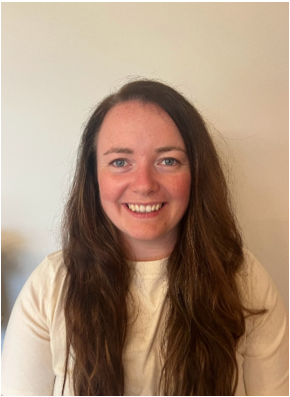 |
Dr Rachel Farrelly Project title: 'Safety culture and psychological safety in the operating room: a survey-based study’. Academic track project supervisors: Professor Maya Contreras MD, PhD, FCARCSI, PDip MedEd – Consultant Anaesthesiologists, University Hospital Galway, Hon Professor, University of Galway, Director of Simulation Training, College of Anaesthesiologists of Ireland. Project summary: Unsafe medical care remains a major global concern, contributing to tens of thousands of preventable deaths each year. In Ireland, research has shown that more than one in ten hospital admissions are associated with an adverse event, many of which could be avoided. Operating rooms (ORs) are particularly high-risk environments. International studies show that 41% of adverse events occurred in the OR, with surgical incidents (39.6%) and drug-related incidents (15.1%) being the most common. The OR is a complex setting where effective teamwork and communication are critical to safe patient care. While patient safety culture has been studied across Irish healthcare, there is limited evidence focusing specifically on OR teams. This pilot study will examine the safety climate and patient safety culture within the ORs of a tertiary university hospital in Ireland. Participants will include surgery, anaesthesia, nursing, allied health professionals, and porters. Two validated tools — the Safety Attitudes Questionnaire (SAQ) and the Psychological Safety Questionnaire (PSQ) — will be used to explore teamwork, safety climate, leadership, and workplace dynamics. This single-centre, survey-based pilot study will inform a larger national study to assess and highlight facilitators and barriers to safety culture in the ORs across the Irish healthcare system. |
 |
Dr Turlough Heffernan Project title: ‘Hypoxia induced glycolysis and glycolytic complex formation in Lamina Cribrosa Fibroblasts’ Academic track project supervisors: Professor Colm O’Brien, Professor of Ophthalmology and Consultant Ophthalmic Surgeon at the UCD Mater Misericordiae University Hospital; Professor Cormac Taylor, UCD Professor of Cellular Physiology. Project summary: Glaucoma is a progressive optic neuropathy characterized by the degeneration of retinal ganglion cells and fibrotic remodelling of the lamina cribrosa (LC) region in the optic nerve head (ONH). Historically, its pathophysiology has mainly been attributed to increased intraocular pressure (IOP). However, this fails to explain why some patients develop glaucomatous damage without elevated IOP, while others with elevated IOP show no ONH damage. An alternative theory proposes that glaucoma results from reduced ocular blood flow and subsequent hypoxia-induced fibrosis. In other tissues, such fibrosis coincides with increased glycolysis in fibroblasts. Therefore, we firstly aim to investigate whether exposing healthy LC fibroblasts to hypoxia drives a glycolytic shift, producing metabolic profiles similar to those of glaucomatous LC fibroblasts. We also aim to characterize the mechanism underlying this shift. The best-characterized pathway is transcriptional, mediated by HIF-1α. However, recent work in intestinal epithelial cells has shown that glycolysis can be induced non-transcriptionally, via enzyme complex formation. We will test whether LC fibroblasts employ this alternative mechanism. This work aims to provide new insight into glaucoma’s pathophysiology and to identify therapeutic targets beyond intraocular pressure - an important goal given that all existing treatments work by reducing IOP, yet many patients progress to irreversible blindness even with adequate pressure control. |
 |
Dr Rachel Kelly Project title: 'The Impact of Frailty on Skin Cancer' Academic track project supervisors: Professor Aoife Lally, Consultant Dermatologist at St. Vincent’s University Hospital.
Project summary: Frailty—not age alone—may shape skin-cancer outcomes. This observational study follows 219 adults aged 55+ presenting with suspected skin cancer.
Patients are classified as frail or non-frail using the Rockwood Frailty Index with the Mini-Mental State Examination, then compared on lifetime skin-cancer burden, severity of the current tumour (e.g., depth and invasion), treatment complexity, and 30-day complications. |
 |
Dr Ellen McGrady Project title: ‘A Clinical Audit of Pancreatic Cancer Care in Ireland: Measuring the timelines to diagnosis and treatment’. Academic track project supervisors: Professor Grainne O’Kane, Consultant Medical Oncologist at St. Vincent’s University Hospital and Pat Smullen Chair in Pancreatic Cancer. Project summary: Approximately 600 people are diagnosed with pancreatic cancer in Ireland annually. 80% will not receive surgery due to their late-stage presentation. Consequently, the 5-year survival rate in Ireland is only 14%. Globally, there have been calls to improve awareness and to aim for earlier detection of pancreatic cancer. Pancreatic Cancer Ireland, the national patient advocacy charity, has a vision to ensure streamlined pathways for patients. However, there is currently no Irish data to help us understand the complexities of the care pathway. Our project involves an audit of 2 years of MDT data from St. Vincent’s University Hospital. The primary aim is to evaluate the time from first referral to diagnosis and the subsequent time to first treatment, for patients diagnosed with pancreatic cancer who have been discussed at MDT. We will endeavour to understand where possible, time between first presentation (GP/Emergency) and to first referral. This audit will aid in the implementation of a national rapid diagnostic clinic for pancreatic cancer. |
 |
Dr Gabriele Naughton Project title: ‘The Eve Study: Exploring Variations by Sex in Antipsychotic Prescribing, Side Effects, and Discontinuation in First Episode Psychosis’. Academic track project supervisors: Dr Sean Naughton, Consultant Psychiatrist at DETECT, early intervention for psychosis service, and Honorary Senior Lecturer at RCSI. Professor Mary Clarke, Consultant Psychiatrist and at DETECT, an early intervention for psychosis service, and Clinical Professor at UCD. Project summary: Sex differences are among the most consistently reported features of psychotic disorders, influencing age of onset, symptom profile, and treatment response. Yet, despite this, current prescribing guidelines remain largely sex neutral. Women generally achieve higher antipsychotic bioavailability, resulting in around 30% greater treatment effect compared to men. However, this pharmacological advantage may also increase vulnerability to adverse effects such as metabolic and hormonal disturbances. These side effects not only impair adherence thus elevating relapse risk but directly contribute to the cardiovascular morbidity and reduced life expectancy observed in schizophrenia. Most existing evidence comes from clinical trials, where women are underrepresented and real-world prescribing practices are rarely examined. Consequently, it remains unclear whether men and women are treated differently in routine clinical practice, and whether any observed variations represent appropriate biological tailoring or unintended disparities in care. Using routinely collected clinical data from DETECT, an early intervention service for psychosis, our study will examine sex differences in antipsychotic prescribing, side-effect burden, and treatment outcomes among individuals experiencing a first episode of psychosis. Through this research, we aim to advance understanding of sex-specific treatment patterns and support the development of more personalised, evidence-based, and equitable treatment strategies for people living with psychosis. |
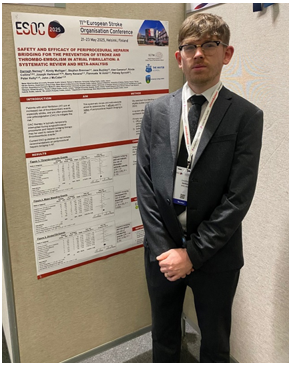 |
Dr Darragh Nerney Project title: ‘Clinical and Biomarker Determinants of Atrial Fibrillation Detection on Extended Cardiac Monitoring After Stroke’. Academic track project supervisors: Dr. John McCabe, Consultant Geriatrician and Stroke Physician at Mater Misericordiae University Hospital (MMUH), Adjunct Assistant Professor at University College Dublin (UCD) and Clinician Scientist at Stroke Clinical Trials Network Ireland (SCTNI). Project summary: Stroke is a heterogeneous disease. Despite extensive diagnostic evaluation, one third of all strokes are unexplained. Patients are routinely screened for atrial fibrillation (AF) with cardiac monitoring after an ischemic stroke or transient ischemic attack (TIA). However, detection rates can be as low as 4% with 24-hour monitoring and long-term monitoring with an implantable loop recorder (ILR) can identify AF in approximately 12% of patients by 12 months. Enhancing pre-test prediction of AFDAS can support prioritisation of patients for timely post-stroke ECM and guide selection of patients who may benefit most from empiric anticoagulation. |
| Dr Richard Ó'Conaill Project title: ‘The CINDI registry: novel approaches to diagnostic uncertainty inpaediatric neurology’. Academic track project supervisors: Dr Susan Byrne, Consultant Paediatric Neurologist, CHI Crumlin; Senior Lecturer, RCSI and FutureNeuro. Project summary: Recent advances in clinical genetics and genomics have allowed us to uncover the genetic causes for many neurological conditions of childhood and development, which represents potential targets for personalised and precision therapies. However, a substantial number of children remain undiagnosed after the current standard of genetics testing, leaving families with distressing uncertainty and their clinicians with limitedtreatment options. CINDI is a new patient registry for children with known and suspected genetic causes of their neurological condition, incorporating clinical, genetic and demographic data. Inclusion on the registry has led to treatment changes and clinical trial enrolment for several patients, and preliminary results will be reported in the coming months. As academic intern, Richard will continue work he began on the CINDI registry in 2024; by analysing data, he and Dr Byrne collected from undiagnosed patients, with a view toward assessing the effectiveness of novel genetic testing techniques. He hopes this research will contribute to ending diagnostic uncertainty for families and ultimately lead to personalised clinical impact.
|
The Academic Track Programme was designed in 2017 to give Interns the opportunity to undertake a three month project in clinical research, medical education or healthcare leadership and management.
There are 48 academic track posts nationally across the six intern networks in Ireland: Dublin Mid-Leinster (UCD), Dublin North-East (RCSI), Dublin South-East (TCD), Mid-West (UL), South (UCC) and West North-West (NUIG) approved by the Irish Medical Council.
UCD Academic Track Programme is delivered in conjunction with the Intern Network Executive, their affiliated Medical Schools and the National Doctors Training & Planning programme (HSE).
UCD Academic Track posts are a combination of clinical rotations with a three -month protected Academic Track rotation. Applicants to the programme can choose a research project in the areas of clinical research, medical education or healthcare leadership and management.
UCD Academic Track – Research Project Opportunities
The UCD Intern Training Network offers a wide range of Academic Track research projects aligned with HSE-recognised clinical specialties and cross-cutting academic domains. Projects are supervised by UCD-affiliated clinicians and academics across multiple teaching hospitals and research institutes.
Academic Track projects span clinical research, population health, quality improvement, registry-based studies, translational research and digital health, in line with national Academic Intern Track principles.
Current UCD Academic Track projects include opportunities in the following areas:
- Medicine & Medical Specialties
Cardiovascular risk reduction studies, metabolic medicine research, infectious diseases outcomes, geriatrics and stroke prevention. - Surgery
Breast, colorectal, hepatobiliary, bariatric and transplant surgery projects, including oncological outcomes, imaging-based tissue analysis and surgical innovation. - Emergency Medicine
National registry participation (e.g. venous thromboembolism), emerging drug trends, and sustainability and simulation-based education initiatives. - Obstetrics & Gynaecology / Women’s Health
Placental pathology and pregnancy outcomes, hormone-related health impacts, and women’s cancer research. - Psychiatry & Mental Health
Studies examining vaccination outcomes in severe mental illness, liaison psychiatry research, and paediatric mental health admissions. - Respiratory, Renal & Transplant Medicine
Interstitial lung disease pathways, biomarker validation, kidney transplant rejection detection and lung transplant monitoring. - General Practice & Population Health
Mapping regional health needs, primary care research priorities, and integrated care models. - Oncology & Cancer Biology
Prostate, breast, bladder, pancreatic and cholangiocarcinoma research, including registry-based and translational studies. - Digital Health, AI & Clinical Informatics
AI-assisted diagnostic imaging, digital prehabilitation programmes, automated clinical summaries, and AI governance frameworks. - Medical Education, Rehabilitation & Integrated Care
Simulation-based education, learning health systems, rehabilitation research and service improvement projects.
UCD Academic track projects
| Supervisor's Name | Supervisor Title | Specialty | Email Address | Project Title |
|---|---|---|---|---|
| Professor Cormac McCarthy | Associate Professor of Medicine, UCD School of Medicine & Consultant Respiratory Physician at St. Vincent's University Hospital | Respiratory Medicine | (opens in a new window)Cormac.mccarthy@ucd.ie | Validation of Novel Serum Biomarkers for Diagnosis and Prognosis in Lymphangioleiomyomatosis Right Test, Right Time: Streamlining the ILD Diagnostic‑to‑Treatment Pathway at St Vincent’s University Hospital Evolution of Fibrotic Change in Pulmonary Alveolar Proteinosis |
| Professor William Watson Mr David Galvin |
Professor of Cancer Biology, UCD School of Medicine, University College Dublin, Head of Pathology and Director of the Biomedical Health and Life Science honours BSc programme. Consultant Urologist, Mater Misericordiae University Hospital |
Pathology & Urology | (opens in a new window)william.watson@ucd.ie | Assessing the landscape and need of prostate cancer outcomes measures in clinical settings using the IPCOR registry |
| Dr Thomas Campbell | Assistant Professor in Human Anatomy, UCD School of Medicine. |
Human Anatomy | (opens in a new window)thomas.campbell@ucd.ie | Investigating the effect of exogenous glutamate on aortic arch baroreceptors |
| Dr Rory O'Donohoe | Consultant Radiologist, St Vincents University Hospital | Radiology | (opens in a new window)rory.odonohoe@svhg.ie | Evaluating the Impact of AI-Assisted Reporting on MRI Brain Studies for Multiple Sclerosis Follow-Up |
| Dr Nicola Ronan | Lung Transplant Consultant, Mater Misericordiae University Hospital | Thoracic Surgery | (opens in a new window)nicolaronan@mater.ie | Evaluating Impulse Oscillometry as a Monitoring Tool for Lung Transplant Graft Function |
| Dr Vyanka Redenbaugh Dr Padraig McGettrick |
Consultant Immunologist & Consultant in Infectious Diseases and General Internal Medicine, Mater Misericordiae University Hospital | Immunology & Infectious Diseases | (opens in a new window)vyankaredenbaugh@mater.ie (opens in a new window)padraigmcgettrick@mater.ie |
Hypogammaglobulinemia in MMUH; aetiology and follow up Secondary antibody deficiency in patients post transplant |
| Dr Aoife Cotter | Consultant in Infectious Diseases and General Internal Medicine, Mater Misericordiae University Hospital | Infectious Diseases | (opens in a new window)aoife.cotter@ucd.ie | Rapid scoping review of Patient-Reported Outcomes Measures (PROMs) implementation in routine Adult |
| Dr Stephen Thorpe Mr Tom Gallagher |
Assistant Professor, UCD Conway Institute of Biomolecular and Biomedical Research, UCD School of Medicine Consultant Hepatobiliary and Transplant Surgeon, St Vincent’s University Hospital |
Hepatobiliary | (opens in a new window)stephen.thorpe@ucd.ie |
Relating Biophysical and Radiomic Pancreatic Ductal Adenocarcinoma Tissue |
| Dr Andrew Malone Dr Aisling O'Riordan Dr Glen Doherty |
Consultant Nephrologist, St Vincents University Hospital Consultant Gastroenterologist, St Vincents University Hospital |
Nephrology/ Gastroenterology |
(opens in a new window)andrew.malone@ucd.ie | Properties to Clinical Outcomes |
| Professor Malcolm Kell | Consultant Surgeon, Mater Misericordiae University Hospital & Clinical Professor, UCD School of Medicine | Surgery | (opens in a new window)malcolm.kell@ucd.ie | Relating Biophysical Breast Cancer Tissue Properties To Subtype And Mammography Features 2. Pathological response rate to neoadjuvant chemotherapy from the Breastcheck population as targeted therapies improve. |
| Professor Brian O'Donoghue | UCD Professor of Adult Psychiatry/Consultant Adult Psychiatrist, UCD School of Medicine | Adult Psychiatry | (opens in a new window)Brian.odonoghue@ucd.ie | Update and barriers to the Influenza and covid vaccinations in people with treatment resistant schizophrenia. |
| Professor Walter Cullen | Full Professor Of Urban General Practise, UCD School of Medicine | General Practice | (opens in a new window)walter.cullen@ucd.ie | Mapping health needs in the Ireland East Region: Mixed methods study of primary and secondary care. |
| Dr Crea Carberry | Lecturer/Assistant Professor & Academic General Practitioner, UCD School of Medicine | General Practice | (opens in a new window)crea.carberry@ucd.ie | What core content areas and learning experience should be prioritised in a general practice - focused deep dive research elective to best prepare medical students for potential future roles in researhc and primary care? |
| Dr Matthew Sadlier | Consultant Liaison Psychiatrist, Mater Misericordiae University Hospital | Psychiatry | (opens in a new window)Matthew.sadlier@ucd.ie | Exploration of the Psychological, Physical and Social effects of pornography use as its presents to Health Care. |
| Dr John McCabe | Consultant Geriatrician, Mater Misericordiae University Hospital | Geriatric Medicine | (opens in a new window)JohnMcCabe@mater.ie | Carotid Plaque Vulnerability and Recurrent Vascular Events after Stroke: A Prospective Cohort Study |
| Dr Linda O'Neill | Associate Professor in Clinical Trials, UCD Clinical Research Centre, UCD School of Medicine | Clinical Trials | (opens in a new window)linda.oneill1@ucd.ie | Rehabilitation in Cholangiocarcinoma - A Scoping Review of the Literature |
Project Areas and Examples
Current UCD Academic Track projects include opportunities in the following areas:
- Medicine & Medical Specialties
Cardiovascular risk reduction studies, metabolic medicine research, infectious diseases outcomes, geriatrics and stroke prevention. - Surgery
Breast, colorectal, hepatobiliary, bariatric and transplant surgery projects, including oncological outcomes, imaging-based tissue analysis and surgical innovation. - Emergency Medicine
National registry participation (e.g. venous thromboembolism), emerging drug trends, and sustainability and simulation-based education initiatives. - Obstetrics & Gynaecology / Women’s Health
Placental pathology and pregnancy outcomes, hormone-related health impacts, and women’s cancer research. - Psychiatry & Mental Health
Studies examining vaccination outcomes in severe mental illness, liaison psychiatry research, and paediatric mental health admissions. - Respiratory, Renal & Transplant Medicine
Interstitial lung disease pathways, biomarker validation, kidney transplant rejection detection and lung transplant monitoring. - General Practice & Population Health
Mapping regional health needs, primary care research priorities, and integrated care models. - Oncology & Cancer Biology
Prostate, breast, bladder, pancreatic and cholangiocarcinoma research, including registry-based and translational studies. - Digital Health, AI & Clinical Informatics
AI-assisted diagnostic imaging, digital prehabilitation programmes, automated clinical summaries, and AI governance frameworks. - Medical Education, Rehabilitation & Integrated Care
Simulation-based education, learning health systems, rehabilitation research and service improvement projects.
Getting Involved
Final Medicine Students wishing to undertake a UCD Academic Track project as part of their Academic Track application are encouraged to engage early.
📅 HSE Academic Intern Track application deadline: Friday, 16 January 2026
📧 For expressions of interest or further information: (opens in a new window)intern.smms@ucd.ie
The UCD Intern Network is pleased to welcome the UCD Academic Track interns for 2024-2025.
The UCD Intern Network Presents
 |
Dr Ali Donnelly Project title: 'The Impact of Atopic Dermatitis on Adolescent Identity Formation' Academic track project supervisors: Professor Alan Irvine, Consultant Dermatologist at Children’s Health Ireland and St James’s Hospital, and Professor of Dermatology at Trinity College Dublin; Dr Chantal Cotter, Consultant Dermatologist with a special interest in Paediatric Dermatology at Our Lady’s Children’s Hospital, Crumlin, and Senior Clinical Lecturer in Paediatrics at Trinity College Dublin. Project summary: Atopic Dermatitis (AD) is a common chronic skin condition affecting up to one in five children in Europe. While its physical symptoms are well documented, far less is known about its psychosocial impact during adolescence — a critical period for identity formation and social development. Our project explores how moderate-to-severe AD affects adolescents’ self-perception, peer relationships, and experiences of stigma. It also examines the influence of digital platforms on treatment decision-making and daily functioning. Using a mixed-methods approach, data is being collected from adolescents and their caregivers across multiple clinical sites. The findings aim to inform the development of targeted psychosocial supports and integrated care pathways for young people living with chronic skin disease. |
 |
Dr Basem Fouda Project title: 'Home-Based Monitoring of Ocular Perfusion Pressure: A Pilot Study' Academic track project supervisors: Professor Colm O'Brien, Professor of Ophthalmology at UCD and Consultant Ophthalmic Surgeon at the Mater Misericordiae University Hospital, Dublin. Project summary: Ocular Perfusion Pressure (OPP) is the pressure at which blood enters the eye, ensuring adequate perfusion of ocular structures. Nocturnal dips in OPP, typically when an individual is in a supine position during sleep, are thought to be a significant factor in glaucoma progression. However, the clinical assessment of OPP is currently limited to single-point measurements taken in an upright position during daytime hours. This pilot study therefore offers a novel methodology combining the Aktiia cuffless 24-hour BP monitor with the iCare HOME2 rebound tonometer to provide an estimate of OPP changes throughout the day and longitudinally over multiple days. The preliminary data collected as part of the academic track internship confirmed the feasibility of our methodology to successfully capture circadian fluctuations in MAP, IOP, and OPP in healthy volunteers and glaucoma patients. This approach will enable monitoring of these key physiological parameters in future research and clinical practice. |
 |
Dr Eimear Kyle Project title: 'The Utility of a Multi-Centre Radiomics Model for Recurrence Risk in T4 Rectal Cancer' Academic track project supervisor: Mr Michael E. Kelly, Consultant Colorectal Surgeon, St. James’ Hospital and St. James’ Cancer Institute. Project summary: T4 rectal cancer presents a significant clinical challenge due to its aggressive nature and rates of postoperative recurrence, despite multimodal therapy and radical surgery. Current prognostic tools, including clinical and pathological staging, offer limited ability to accurately predict which patients are most likely to experience disease recurrence after treatment. Radiomics is an emerging imaging science that extracts quantitative data from standard medical imaging, potentially revealing hidden patterns that correlate with tumour behaviour and patient outcomes. This technology may allow for the development of personalised, non-invasive prediction models based on routine pre-treatment imaging. This project aims to create and validate a radiomics-based model using T2-weighted MRI to estimate recurrence risk in patients with T4 rectal cancer undergoing exenterative surgery. By using multi-centre data, this work will assess the model’s generalisability across different clinical settings. The goal of this project is to improve risk stratification and support individualised postoperative care in this high-risk group. |
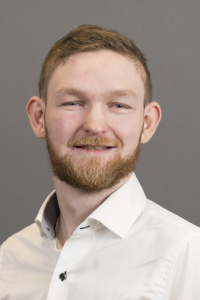 |
Dr Kielan Wilson Project title: 'The impact of psychiatric illness on outcomes following spine surgery.' Academic track project supervisor: Professor Joseph Butler, Consultant Spine Surgeon and the Clinical Lead at the National Spinal Injuries Unit, Mater Misericordiae University Hospital. Project summary: Psychiatric disorders, including anxiety, depression, dementia, psychosis and bipolar affective disorder represent a significant global health burden. These conditions have been linked to poorer physical health outcomes, including increased postoperative complications in surgical populations. However, the impact of pre-existing psychiatric comorbidities on spine surgery outcomes remains poorly understood. This study evaluates whether patients with psychiatric disorders undergoing spine surgery experience worse postoperative outcomes compared to those without such conditions. Additionally, it investigates whether specific psychiatric subgroups exhibit distinct post-operative morbidity patterns. |
 |
Dr Lucy Dockery Project title: 'Navigating The Transition: A Comprehensive Study on the Impact of Primary to Secondary School Transition Care on T1D Management' Academic track project supervisor: Professor Clodagh S O Gorman, Professor of Paediatrics, University Hospital Limerick. Project summary: Type 1 Diabetes (T1D) is an auto-immune disease typically diagnosed in childhood, and requires lifelong vigilance. Previous studies link decreased school performance and increased diabetes-related complications in children with T1D as they approach adolescence and take on the burden of disease care themselves. The transition from primary to secondary school poses challenges, requiring greater disease autonomy amid unpredictable behaviour and physiological difficulties in glycaemic control. A high burden of responsibility is placed on caregivers to check young children's blood glucose levels, administer insulin, and monitor diet/physical activity. At this time, a higher degree of disease autonomy is required with both an increased desire of the child for independence and a reduced ability of the school to act as caregiver. This project aims to understand this cohort and how we can better equip T1D outpatient services to plan for and adjust to this change in schooling, aiming to prevent the negative impact on disease management and improve disease autonomy. As T1D becomes more prevalent in the Irish population, maximising care effectiveness and preserving quality of life is of fundamental importance. The primary aim of this study is to assess the challenges associated with T1D in children in this cohort and assess the quality of life of these children before and after starting secondary school. It will also evaluate parental concerns and the support available to the families at this time. The premise of this study is that the typical T1D child will need more disease autonomy in secondary school compared to primary school. The goal is to use the strengths and weaknesses described by the children and their families to support developing age-appropriate autonomy for this transition. We aim to work with representatives from the patient/parent cohort so that this autonomy support will be co-produced in collaboration with the children and families it will serve. |
 |
Dr Matthew Laffey Project title: 'Outcomes of prostate artery embolization in the setting of benign prostatic hyperplasia in poor surgical candidates' Academic track project supervisor: Dr Cormac Farrelly, Consultant Interventional Radiologist, Mater Misericordiae University Hospital. Project summary: Benign prostatic hyperplasia (BPH) is a common cause of lower urinary tract symptoms and obstruction in men. Current guidance recommends transurethral resection of prostate (TURP) and prostatectomy as the standard of care surgical treatments to address lower urinary tract symptoms and obstruction in medically refractory BPH, however, these are not suitable in all patients. This project aims to assess the efficacy and safety of prostatic artery embolization as a minimally invasive treatment option for those with symptomatic BPH who are poor candidates for TURP or prostatectomy. Through this project, we shall retrospectively assess baseline characteristics, procedural factors, and clinical outcomes of patients who underwent bilateral prostatic artery embolization at our institution. All patients either declined or were otherwise deemed poor candidates for TURP or prostatectomy by their referring Urological team. Findings from this study will contribute to the existing evidence base and better inform the role of prostatic artery embolization as a treatment option in this cohort. |
The UCD Intern Network is pleased to welcome the UCD Academic Track interns for 2023-2024.
The UCD Intern Network Presents
 |
Dr Damien Doherty Project title: ‘Mantle Cell Lymphoma in Ireland: A Real-World Database Registry Study’ Academic track project supervisor: Professor Elisabeth Vandenberghe Clinical Professor Trinity College Dublin, and Consultant Haematologist and Lymphoma Clinical Lead at St James’s Hospital. Project summary: This project aims to contribute to and analyse the first registry of mantle cell lymphoma (MCL) in Ireland. MCL is a non-Hodgkins lymphoma that has seen a paradigm shift in treatment options in recent years. Through this project we hope to collect current, real-world data on MCL in the Irish context with a view to contributing to the European MCL group's database. Our findings will help us to better understand the epidemiology of MCL in Ireland, inform health resource planning, and provide a basis on which future translational and clinical research can be conducted. |
 |
Dr Robin Keane Project title: ’Investigating the requirements for a transition care service for adolescents and young adults (AYAs) with cancer in Ireland’ Academic track project supervisor: Professor Owen Smith CBE; Professor of Paediatric and Adolescent Medicine, UCD; Consultant Paediatric Haematologist, Our Lady’s Children’s Hospital, Crumlin; Chief Academic Lead to the Children’s Hospital Group; Hon. Regius Professor of Physic [1637], TCD. Project summary: The current pathway for AYAs transitioning from paediatric to adult cancer services is ad hoc and individually based. Poor transition is associated with poor clinical outcomes, increased ED presentations, and increased hospital and ICU admissions. The AYA cohort constitutes a unique group requiring tailored medical and psychosocial care. Survival rate improvement for AYAs as well as rates of enrollment in clinical trials lags behind both adult and paediatric groups. The number of patients within the Irish Children’s Cancer Service requiring transition services is unknown. Quantifying this and researching the needs and expectations of these patients are vital first steps in the provision of a proper transition service. This project involves the creation of a rich dataset of the patients in the National Children’s Cancer Service (NCCS) who will require transition services, including their diagnoses, locations, and clinical follow up needs. As well as this, the concerns, self-reported needs, and expectations of AYAs preparing to transition to adult care will be assessed. |
 |
Dr Stephen Kelly Project Title: ‘Evaluating the safety and efficacy of the new RetinaScreen pathways’ Academic track project supervisor: Professor David Keegan Consultant Ophthalmologist at Mater Misericordiae University Hospital, Clinical Professor University College Dublin and Clinical Lead at Diabetic RetinaScreen. Project Summary: RetinaScreen is the diabetic retinopathy screening programme run by the National Screening Service. It was started in 2013 with most patients being screened on an annual basis but has evolved over time as different pathways have been introduced on a rolling basis. These new pathways include the two-year interval screening, digital surveillance, and the pregnancy screening pathways. While these pathways have been shown to be safe and effective in similar programmes in other countries, they still need to be evaluated in an Irish context. This project aims to evaluate the safety and efficacy of the three new pathways within Ireland. |
 |
Dr Blanca Lenoci Project title: ‘Posturography and cognitive motor interference in cervical dystonia’ Academic track project supervisor: Dr Conor Fearon, Consultant Neurologist, Mater Misericordiae University Hospital Project summary: I am collaborating with the Irish Dystonia Research Group to investigate cognitive-motor interference in patients with cervical dystonia. We use the dual task paradigm to assess the extent to which simultaneous performance of attention-demanding cognitive tasks interfere with automatic motor activity. It is hypothesized that the poor balance and postural control seen in cervical dystonia is not only due to dystonic posture per se but is significantly impacted by impaired dual-task performance, or cognitive-motor interference, resulting in increased risk of falls and lowered quality of life in this patient cohort. Investigating how these tasks compete for the same resources within the cognitive system can help us understand how network connectivity is impaired in cervical dystonia as well as improve patient rehabilitation and mitigate fall risk. |
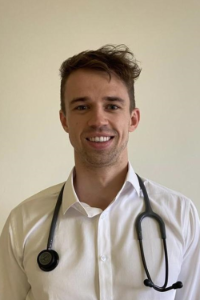 |
Dr Harry Marland Project title: ‘Comparative outcomes of early vs delayed surgical intervention in geriatric patients with spinal fractures and concomitant spinal cord injuries’ Academic track project supervisor: Professor Joseph Butler, Consultant Spine Surgeon at the National Spinal Injuries Unit, Mater Misericordiae University Hospital. Project summary: Trauma remains a leading cause of morbidity and mortality for patients of all age groups. Currently, the literature suggests that early surgical fixation of the spinal column reduces the rate of perioperative complications in traumatic spinal cord injuries. However, the elderly population have high rates of morbidity and mortality following traumatic spinal cord injuries but are also at increased risk of intraoperative and postoperative complications. This makes treatment decision-making less clear and more challenging in this cohort compared to younger patients with similar injuries. The purpose of this study, to identify the optimal time to surgical fixation in elderly patients presenting with traumatic spinal cord injuries and to determine whether delaying surgical intervention to optimise patient comorbidities affects outcomes. |
 |
Dr Sarah Miles Project title: ‘Exploring the association between systemic inflammation, HIV reservoir size and the CTIP2 biomarker in people with HIV (PWH) within the All-Ireland Infectious Disease Cohort’ Academic track project supervisor: Professor Paddy Mallon, Consultant Infectious Diseases SVUH, Professor of Microbial Diseases, Director of the Centre for Experimental Pathogen Host Research (CEPHR), Director Welcome Trust - HRB Irish Clinical Academic Training Programme. Project summary: While antiretroviral therapy (ART) has transformed HIV medicine, People with HIV (PWH) remain at higher risk of age-related comorbidities compared to the general population, which is thought to be related to ongoing immune dysfunction and inflammation. This study will be a subanalysis of a larger study, which aims to characterize the relationship between inflammation and prevalent clinical outcomes in PWH. I will advance this project by firstly measuring HIV viral reservoir size and circulating levels of CTIP2 within the study population. I will then correlate these findings with markers of inflammation and clinical outcomes within this group. CTIP2 is a cellular cofactor which has been shown to play a role in HIV-1 gene silencing in latently infected reservoirs. The mechanistic role of CTIP2 in the inflammatory process remains unclear. We hypothesize that elevated levels of circulating CTIP2 in plasma are associated with higher levels of inflammation and could be indicative of the HIV reservoir size in PLWH. This study will help to further define the underlying molecular mechanisms driving persistent inflammation observed in PWH, which will be essential for the future management of health outcomes in this population. |
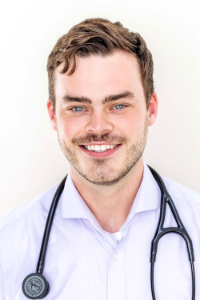 |
Dr Ned Quirke Project title: ‘Primary Closure Versus Myocutaneous Flap Closure Of Abdominoperineal Resection (APR) And Pelvic Exenteration Defects, A Systematic Review And Meta-Analysis’ Academic track project supervisor: Ms Shirley Potter, Consultant Plastic and Reconstructive Surgeon at Mater Misericordiae University Hospital, Dublin Project summary: Recent advancements in the surgical management of advanced pelvic malignancies have improved oncological outcomes while simultaneously posing a challenge to reconstructive surgeons. New surgical techniques have permitted extended oncological resections which result in extensive tissue defects. Despite the improved oncological outcomes from such radical surgeries, there can be considerable postoperative morbidity associated with these procedures. Perineal wound complications occur in as many as 60% of cases, with wound dehiscence and breakdown the most severe, having a significant impact on patient recovery and quality of life, oftentimes necessitating longer hospital stays and further interventions. To manage this problem, several perineal closure techniques have been applied over the past decades. Myocutaneous flaps have been proposed in place of primary closure to improve wound healing. Currently, there is no clear consensus on which method to use. I will conduct a systematic review and meta-analysis to compare primary closure with myocutaneous flap reconstruction of perineal defects following abdominoperineal resection or pelvic exenteration regarding surgical-site complications. |
 |
Dr Ruth Walsh Project title: ‘Blood-Brain-Barrier Evaluation of Patients with Highly Refractory Focal Epilepsy Before and After High Dose Intravenous Methylprednisolone’ Academic track project supervisor: Dr Elisabeth Doran (Consultant Neurologist and Director of the Epilepsy Service at St James's Hospital, Dublin). Project summary: The Epilepsy Service at St James’s Hospital has been investigating and treating patients with highly refractory focal epilepsy with immunotherapy as a palliative treatment trial based on the assumption of possible underlying autoimmune epilepsy. Initial results are promising, with some patients exhibiting sustained responses to treatment with Methylprednisolone and significant reductions in seizure frequency. Our new hypothesis is that, in some of these patients, the response to Methylprednisolone may have been caused by stabilisation of the blood brain barrier (BBB) rather than the immunomodulatory effect of Methylprednisolone. To study BBB function, we will use dynamic contrast MRI (dcMRI) as well as serum testing of several brain-specific or brain- enriched proteins. To investigate this further, I aim to recruit patients from the Refractory Epilepsy Clinic who will be receiving a course of intravenous Methylprednisolone for highly refractory epilepsy and investigate their BBB function using dcMRI and BBB serum marker testing. |
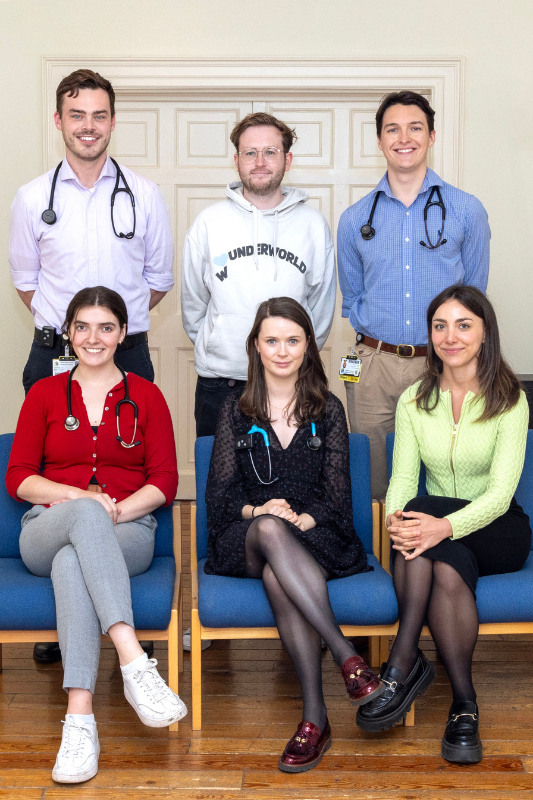
Top Row: Dr Ned Quirke, Dr Stephen Kelly, Dr Damien Doherty.
Seated: Dr Ruth Walsh, Dr Robin Keane, Dr Blanca Lenoci.
The UCD Intern Network is pleased to welcome the UCD Academic Track interns for 2022-2023.
The UCD Intern Network Presents
 |
Dr Michael Keane Project Title: ‘Neural Correlates of Executive Dysfunction in People with Obesity’ Academic Track Project Supervisor: Professor Donal O Shea, Consultant Endocrinologist, Head of the Obesity Research Group, St Vincent’s University Hospital |
 |
Dr Sorcha Murray Project Title: ‘The impact of Dupilumab on Quality of Life in patients with atopic dermatitis – a qualitative study’ Academic Track Project Supervisor: Professor Anne-Marie Tobin, Professor in Clinical Medicine Trinity College Dublin and Clinical Lead National Dermatology Programme Health Service Executive |
 |
Dr Robert Power Project Title: ‘Non-genetic cancer risk factors among Irish individuals with Lynch syndrome: a cross sectional study’ Academic Track Project Supervisor: Professor Maeve Lowery, Professor of Translational Cancer Medicine at Trinity College Dublin and Consultant Medical Oncologist at St James's Hospital |
 |
Dr Emily Panteli Project Title: ‘Eye-Tracking Technology as an Adjunct in the education of Paediatric Trainees to identify abnormal head shapes associated with non-syndromic craniosynostosis’ Academic Track Project Supervisor: Mr. Dylan Murray, Consultant Craniofacial, Plastic and Reconstructive Surgeon, National Paediatric Craniofacial Centre, Children’s Health Ireland at Temple Street and the Department of Plastic Surgery, Mater Misericordiae University Hospital, Clinical Lead at the National Paediatric Craniofacial Centre |
DML/UCD Academic Track Internship, 2024-2025
UCD Academic Track Study Day
Date: Friday, 21 March 2025
Venue: University Club, University College Dublin
Programme: DML/UCD Academic Track Internship 2024–2025
The UCD Academic Track Study Day was held on Friday, 21 March 2025, at the University Club in UCD. This event was coordinated by the UCD Intern Network in collaboration with the UCD Clinical Research Centre as part of the UCD Academic Track Internship. The day brought together Academic Track interns for a focused series of lectures designed to build foundational knowledge in clinical trial design, statistics, and translational research.
Topics and Speakers:
- Welcome Address
Professor Peter Doran, Full Professor of Clinical Trials, Director, UCD Clinical Research Centre, UCD School of Medicine - Formulating Your Hypothesis: The Research Method
Dr Deborah Wallace, Assistant Professor in Clinical Research, Academic Director, Graduate Programme in Clinical and Translational Research, UCD Clinical Research Centre, UCD School of Medicine - Clinical Trial Principles
Professor Peter Doran, Full Professor of Clinical Trials, Director, UCD Clinical Research Centre, UCD School of Medicine - Clinical Trial Designs
Dr Linda O’Neill, Assistant Professor in Clinical Trials, UCD Clinical Research Centre, UCD School of Medicine - Statistical Considerations in Clinical Trials
Dr Marie Galligan, Biostatistician / Clinical Research Tutor, UCD Clinical Research Centre, UCD School of Medicine - Choosing the Correct Endpoints in a Clinical Trial
Professor Patrick Murray, Professor of Clinical Pharmacology, UCD Clinical Research Centre, UCD School of Medicine
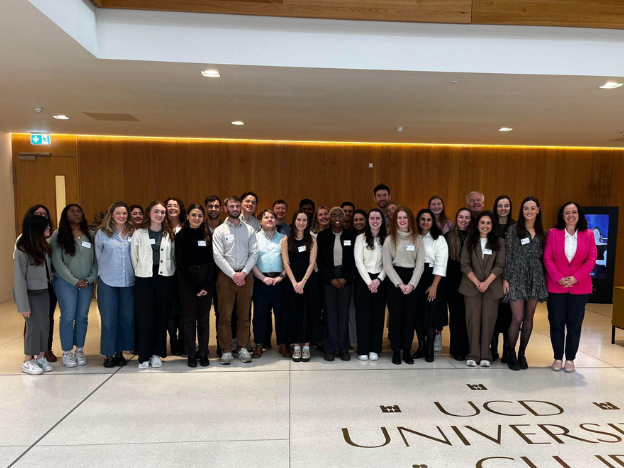
Speakers and attendees.
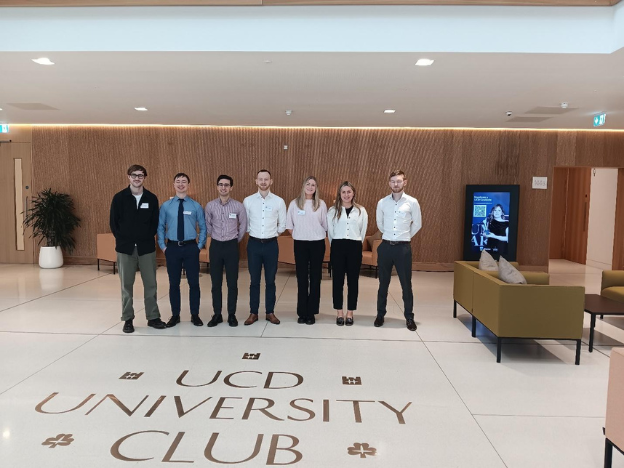
L-R: UCD interns: Dr Sean Kerr, UCD Academic Track Intern, Dr Matthew Laffey, UCD Academic Track Intern, Dr Basem Fouda, UCD Academic Track Intern, Dr Ryan Wilson, UCD Academic Track Intern, Dr Lauren Donnelly, UCD Academic Track Intern, Dr Lucy Dockery, UCD Academic Track Intern, Dr Kielan Wilson, UCD Academic Track Intern
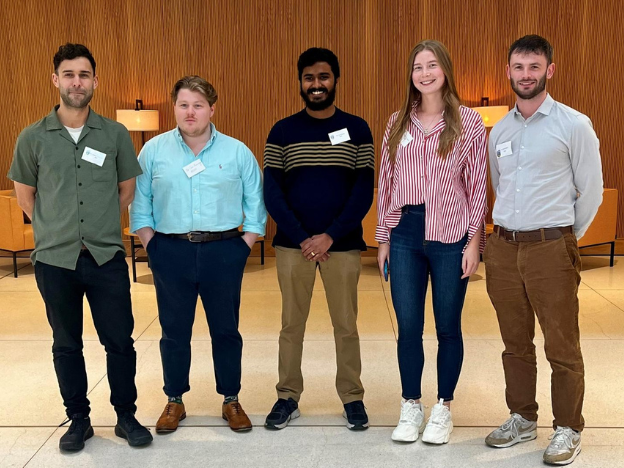
L-R: RCSI interns: Dr Robert Castledine, RCSI Academic Track Intern, Dr Conor Kennedy, RCSI Academic Track Intern, Dr Joel Rajesh, RCSI Academic Track Intern, Dr Aoife Leonard, RCSI Academic Track Intern, Dr Brian Cleary, RCSI Academic Track Intern

L-R: UL interns: Dr Seoidin McKittrick, UL Academic Track Intern, Dr Ming Chuen Chong, UL Academic Track Intern, Dr Jennita Ariaratnam, UL Academic Track Intern, Dr Luis Bouz Mkabaah, UL Academic Track Intern

L-R: NUIG interns: Dr Alex Nugent, University of Galway Academic Track Intern, Dr Yara Alemi, University of Galway Academic Track Intern, Dr Clara Doran, University of Galway Academic Track Intern, Dr Vivian Forde, University of Galway Academic Track Intern, Dr Eoin Kerin, University of Galway Academic Track Intern
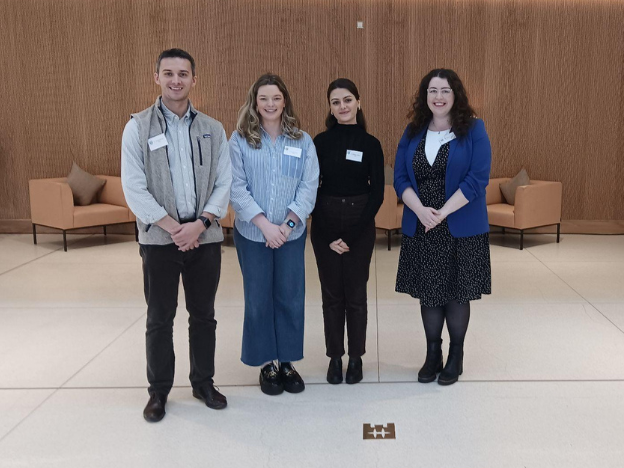
L-R: TCD interns: Dr Stephen Browne, TCD Academic Track Intern, Dr Lauren Hayes, TCD Academic Track Intern, Dr Yasmine Tadjine, TCD Academic Track Intern, Dr Aine Harris, TCD Academic Track Intern

L-R: UCC interns: Dr Caoimhe Cronin, UCD Academic Track Intern, Dr Dorcas Oyenwande, UCC Academic Track Intern, Dr Alexa Mitroi, UCC Academic Track Intern Dr Sophie Broderick, UCC Academic Track Intern, Dr Aisling Maher, UCC Academic Track Intern, Dr Kathryn McCracken, UCC Academic Track Intern, Dr Julie Twomey, UCC Academic Track Intern

DML/UCD Academic Track Internship, 2022-2023
UCD Clinical Trials Masterclass
The UCD Clinical Trials Masterclass was held on Saturday, 01 October. This Masterclass was facilitated by the UCD Intern Network in conjunction with the UCD Clinical Research Centre supporting the UCD Academic Track Intern Programme and included Academic Track interns from across the six intern networks in Ireland who attended this event as they embark on their Academic Track Programme which commenced on July 2022.
Topics and Speakers included:
- Drug Discovery and Development by Dr Deborah Wallace, Assistant Professor in Clinical Research, UCD School of Medicine
- Preclinical Trials by Dr Deborah Wallace, Assistant Professor in Clinical Research, UCD School of Medicine
- Trials Principles & Concepts by Dr Deborah Wallace, Assistant Professor in Clinical Research, UCD School of Medicine
- Trial Designs by Dr Deborah Wallace, Assistant Professor in Clinical Research, UCD School of Medicine
- Statistical Considerations- Hypothesis Testing, Power, Sample Size & Randomisation/ Blinding by Professor Peter Doran, Vice Principal, Research, Innovation & Impact, UCD College of Health & Agricultural Science, Associate Dean, Research, Innovation & Impact, UCD School of Medicine Director, UCD Clinical Research Centre
- Randomisation & Blinding by Professor Peter Doran, Vice Principal, Research, Innovation & Impact, UCD College of Health & Agricultural Science, Associate Dean, Research, Innovation & Impact, UCD School of Medicine Director, UCD Clinical Research Centre
- Trial Endpoints by Professor Patrick Murray, Professor of Clinical Pharmacology, UCD School of Medicine
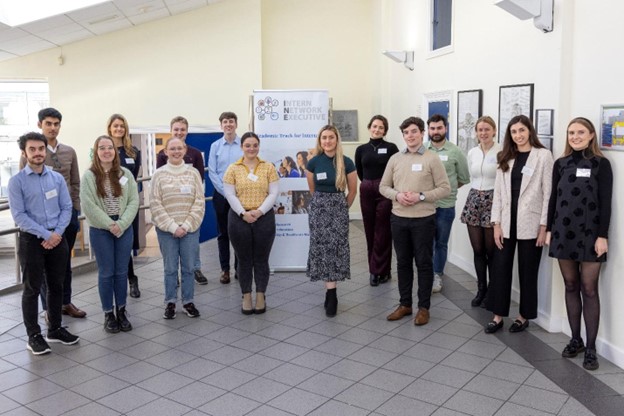
L - R: Dr Ray Abbas, NUIG Academic Track Intern, Dr Muhammad Muneeb Umar, UCD Intern, Dr Rachel Power, RCSI Academic Track Intern, Dr Sadbh O Connor, NUIG Academic Track Intern, Dr Sian McGarel, NUIG Academic Track Intern, Dr Conor Fitzmaurice, RSCI Academic Track Intern, Dr Emily Panteli, UCD Academic Track Intern, Dr Robert Power, UCD Academic Track Intern, Dr Aoibhinn McCool UL Academic Track Intern, Dr Alannah Grealy, TCD Academic Track Intern, Dr Glen Curtin, UL Academic Track Intern, Dr Aidan Kelly, TCD Academic Track Intern, Dr Annie Duffy, RCSI Academic Track Intern, Dr Kate Coakley, UCC Academic Track Intern, Dr Róisin McDonnell, UCC Academic Track Intern
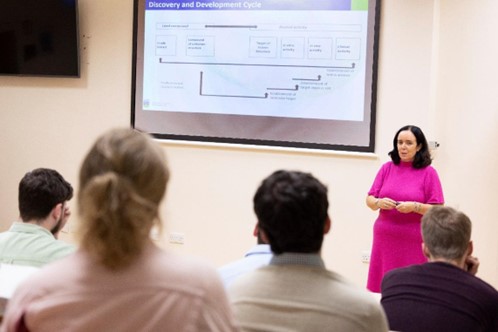
R: Dr Deborah Wallace, Assistant Professor in Clinical Research, UCD School of Medicine
 |
 |
| L-R: Dr Deborah Wallace, Assistant Professor in Clinical Research, UCD School of Medicine, Dr Aidan Kelly, TCD Academic Track Intern, Dr Alannah Grealy, TCD Academic Track Intern | L-R: Dr Deborah Wallace, Assistant Professor in Clinical Research, UCD School of Medicine, Dr Róisin McDonnell, UCC Academic Track Intern, Dr Kate Coakley, UCC Academic Track Intern |
 |
 |
| L-R: Dr Deborah Wallace, Assistant Professor in Clinical Research, UCD School of Medicine, Dr Sadbh O Connor, NUIG Academic Track Intern, Dr Sian McGarel, NUIG Academic Track Intern, Dr Ray Abbas, NUIG Academic Track Intern | L-R: Dr Deborah Wallace, Assistant Professor in Clinical Research, UCD School of Medicine, Dr Aoibhinn McCool UL Academic Track Intern, Dr Glen Curtin, UL Academic Track Intern |
 |
 |
| L-R: Dr Deborah Wallace, Assistant Professor in Clinical Research, UCD School of Medicine, Dr Emily Panteli, UCD Academic Track Intern, Dr Robert Power, UCD Academic Track Intern | L-R: Dr Deborah Wallace, Assistant Professor in Clinical Research, UCD School of Medicine, Dr Conor Fitzmaurice, RSCI Academic Track Intern, Dr Rachel Power, RCSI Academic Track Intern, Dr Annie Duffy, RCSI Academic Track Intern |

L-R: UCD Academic Track Interns Dr Emily Panteli, UCD Academic Track Intern, Dr Robert Power, UCD Academic Track Intern
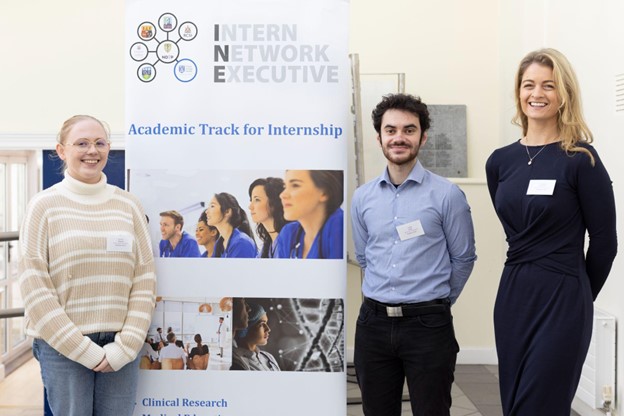
L-R: NUIG interns Dr Sadbh O Connor, NUIG Academic Track Intern, Dr Sian McGarel, NUIG Academic Track Intern, Dr Ray Abbas, NUIG Academic Track Intern
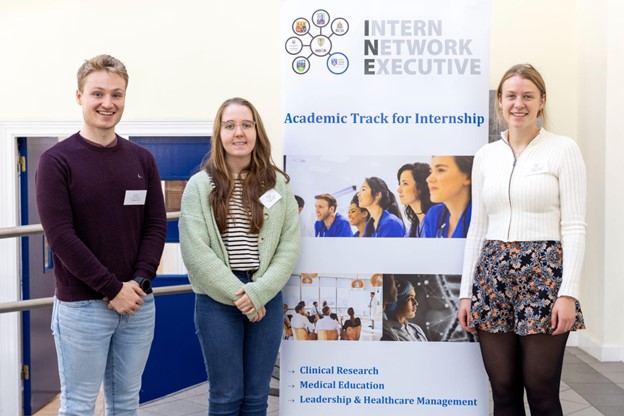
L-R: RCSI interns Dr Conor Fitzmaurice, RSCI Academic Track Intern, Dr Rachel Power, RCSI Academic Track Intern, Dr Annie Duffy, RCSI Academic Track Intern

L-R: UCC interns Dr Róisin McDonnell, UCC Academic Track Intern, Dr Kate Coakley, UCC Academic Track Intern
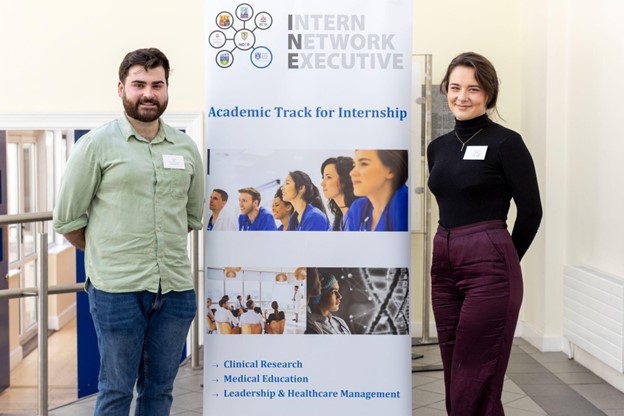
L-R: TCD interns Dr Aidan Kelly, TCD Academic Track Intern, Dr Alannah Grealy, TCD Academic Track Intern

L-R: UL interns Dr Aoibhinn McCool UL Academic Track Intern, Dr Glen Curtin, UL Academic Track Intern
Professor Donal O Shea, UCD Intern Network Coordinator would like to extend his thanks to all who participated in the event and to Professor Peter Doran, Director of the Clinical Research Centre and his colleagues for their valuable input and expertise in this subject area.
Details on the UCD Academic Track Programme can be found here.
UCD Clinical Trials Masterclass 01st Oct 2022
The UCD Clinical Trials Masterclass open to all Academic Track interns nationally is on Saturday, 01st October 2022 at the Catherine McAuley Education & Research Centre, Nelson Street, Dublin 7. This Masterclass is facilitated by the UCD Intern Network in conjunction with the UCD Clinical Research Centre and will include Academic Track interns from across the six intern networks in Ireland as they embark upon their Academic Track Programme which commenced on July 11th, 2022.
Further details regarding the UCD academic track rotations for 2023 - 2024 will be released shortly.
 The UCD Clinical Trials Masterclass open to all Academic Track interns nationally was held on Saturday, 25 September 2021 at the Catherine McAuley Education & Research Centre, Nelson Street, Dublin 7.This Masterclass was facilitated by the UCD Intern Network in conjunction with the UCD Clinical Research Centre supporting the UCD Academic Track Intern Programme and included Academic Track interns from across the six intern networks in Ireland who attended this event as they embark on their Academic Track Programme which commenced on July 5th, 2021.
The UCD Clinical Trials Masterclass open to all Academic Track interns nationally was held on Saturday, 25 September 2021 at the Catherine McAuley Education & Research Centre, Nelson Street, Dublin 7.This Masterclass was facilitated by the UCD Intern Network in conjunction with the UCD Clinical Research Centre supporting the UCD Academic Track Intern Programme and included Academic Track interns from across the six intern networks in Ireland who attended this event as they embark on their Academic Track Programme which commenced on July 5th, 2021.
Topics and Speakers included:
- Generating Knowledge by Professor Peter Doran, Director, UCD Clinical Research Centre, Director, Taught Graduate Programme in Clinical Research, UCD School of Medicine, Director of Research, St Vincent’s University Hospital
- Drug Discovery and Development by Dr Deborah Wallace, Clinical Research Tutor, UCD Clinical Research Centre
- Preclinical Development by Dr Deborah Wallace, Clinical Research Tutor, UCD Clinical Research Centre
- Clinical Trials Principles by Professor Peter Doran, Director, UCD Clinical Research Centre, Director, Taught Graduate Programme in Clinical Research, UCD School of Medicine, Director of Research, St Vincent’s University Hospital
- Randomisation & Blinding by Dr Marie Galligan, Clinical Research Tutor, UCD Clinical Research Centre
- Statistical Considerations- Hypothesis Testing, Power, Sample Size & Randomisation/ Blinding by Dr Marie Galligan, Clinical Research Tutor, UCD Clinical Research Centre
- Designing Trials by Dr Deborah Wallace, Clinical Research Tutor, UCD Clinical Research Centre
- Trial Designs by Professor Peter Doran, Director, UCD Clinical Research Centre, Director, Taught Graduate Programme in Clinical Research, UCD School of Medicine, Director of Research, St Vincent’s University Hospital
The masterclass covered topics such as Drug Discovery and Development, Preclinical Trials & Trial Designs by Dr Deborah Wallace, Clinical Research Tutor, UCD Clinical Research Centre, Knowledge Generation by Professor Peter Doran, Director, UCD Clinical Research Centre and Statistical Considerations- Hypothesis Testing, Power, Sample Size & Randomisation/ Blinding by Dr Marie Galligan, Clinical Research Tutor, UCD Clinical Research Centre.
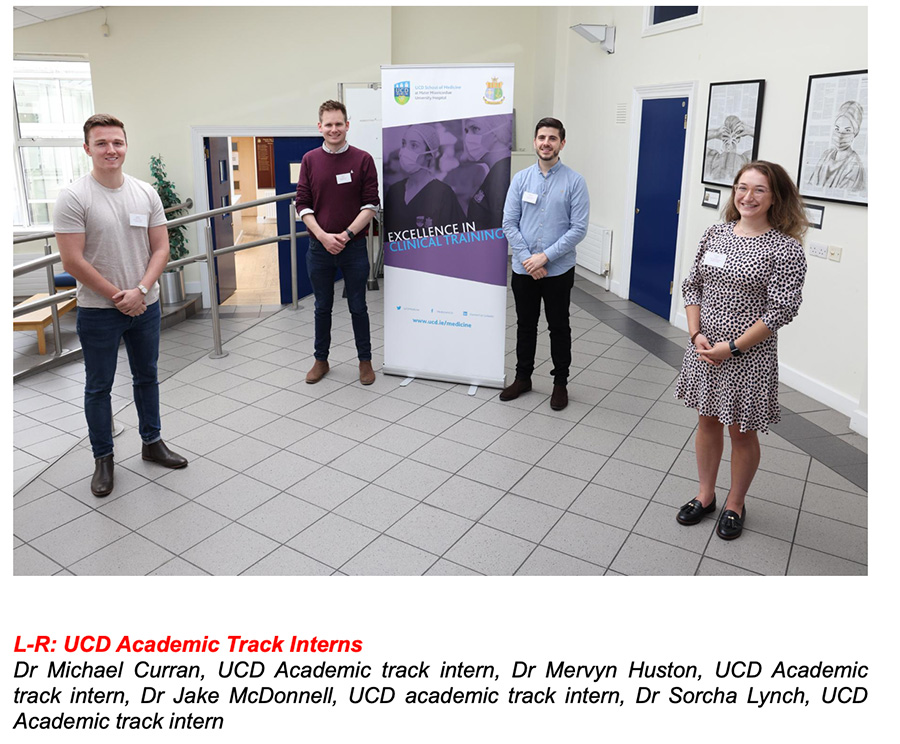
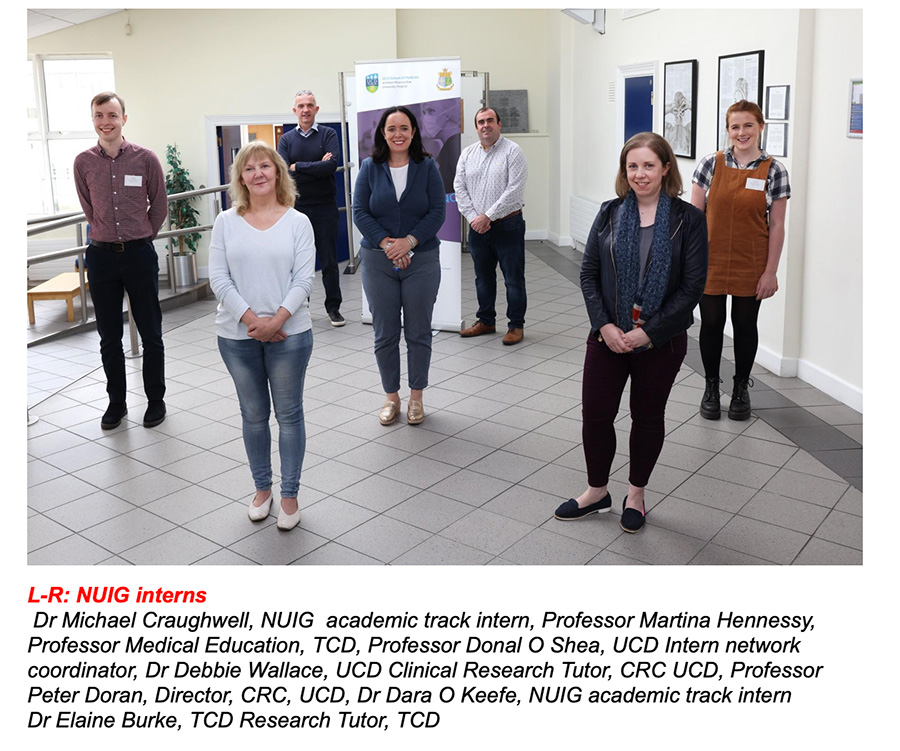
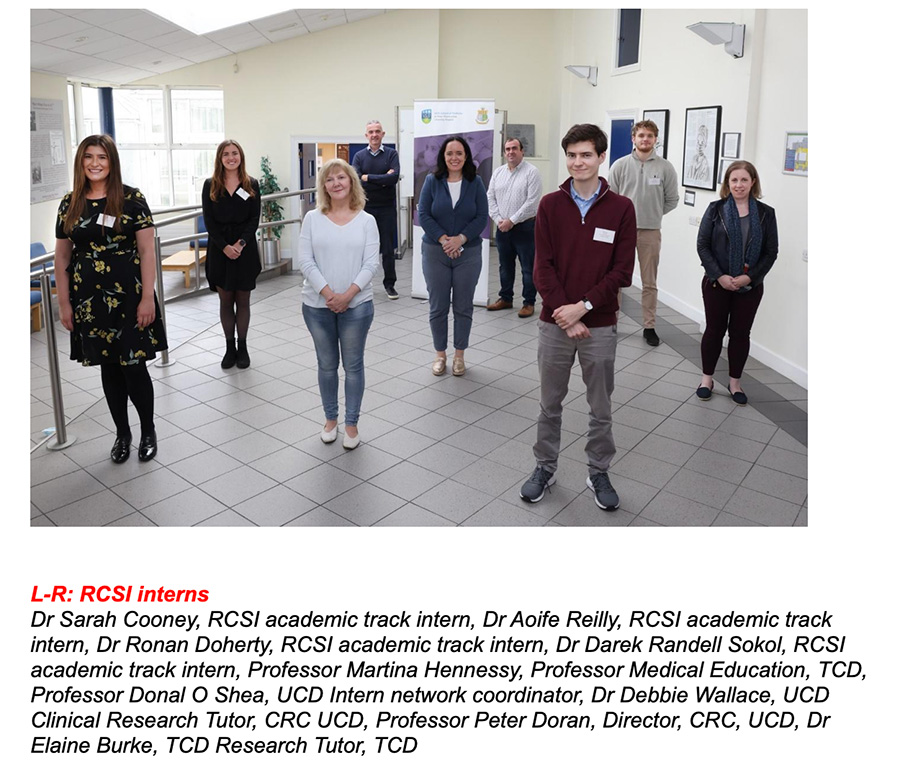
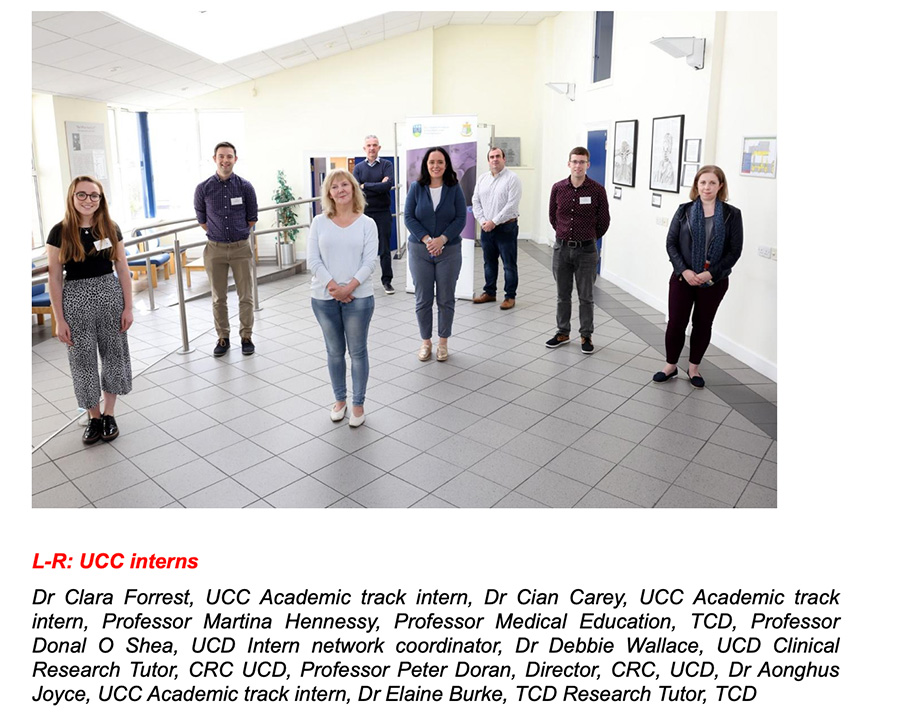
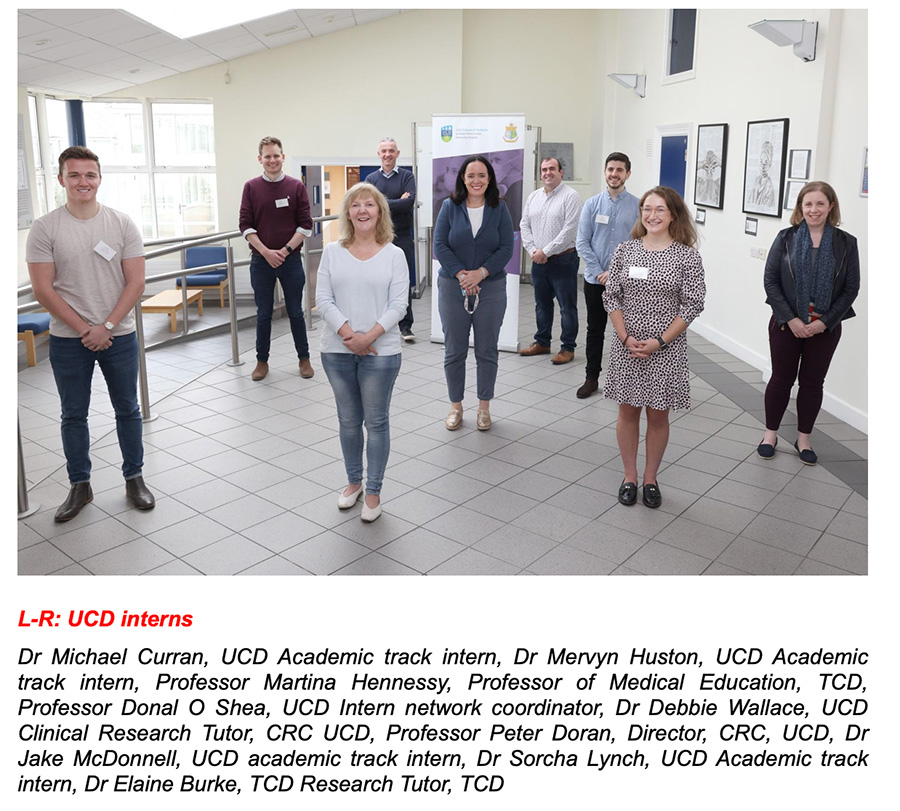
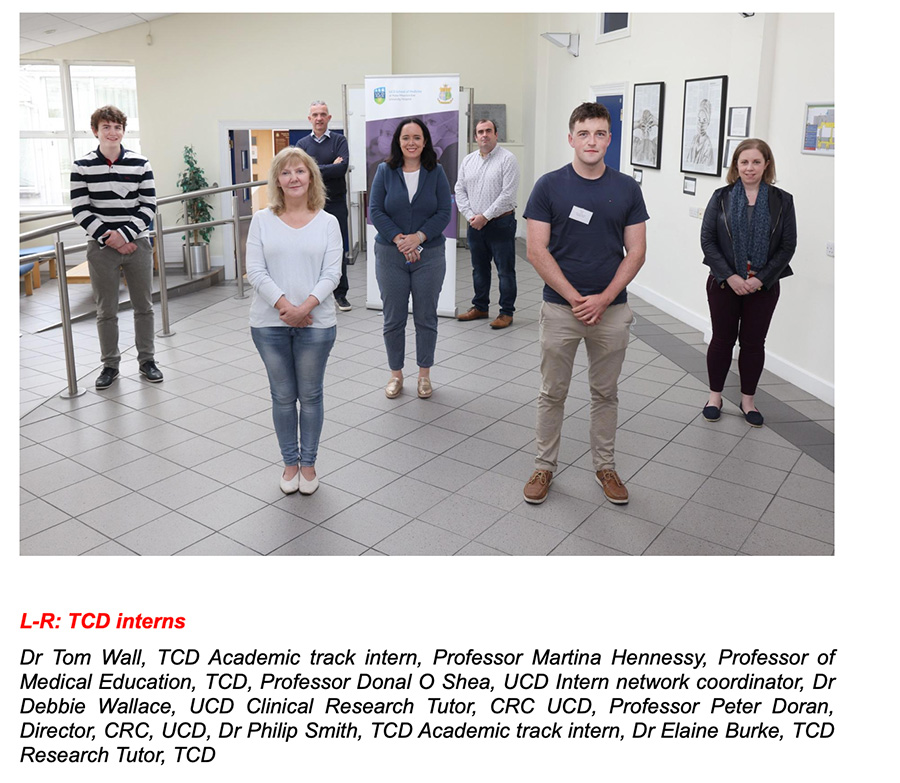
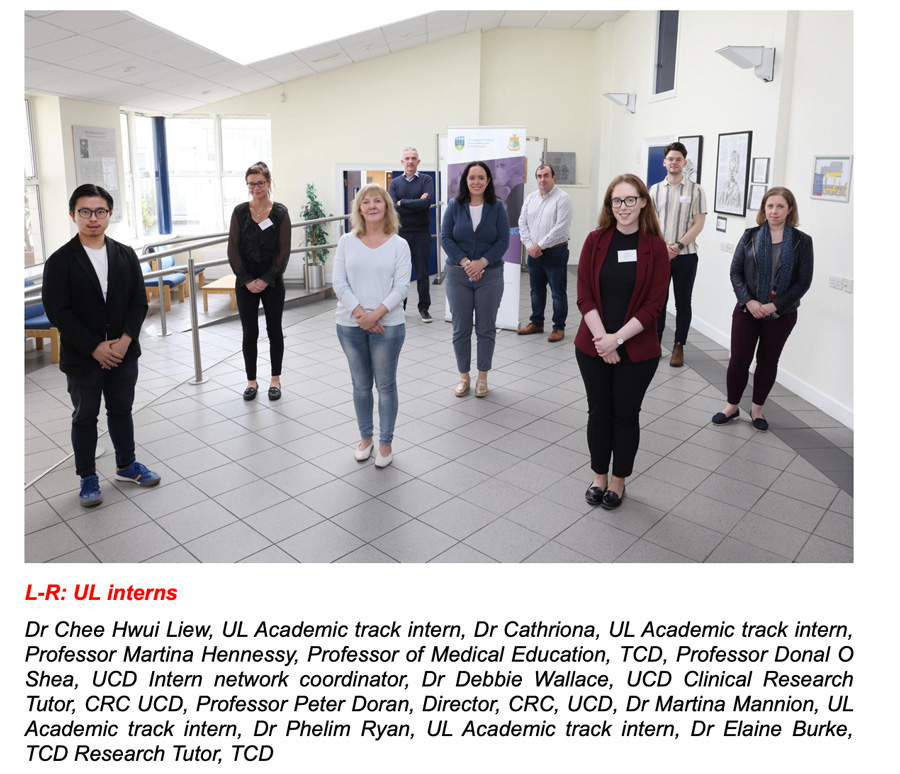
The UCD Intern Network supports Academic Track Intern Posts with:
- UCD Academic Track Intern Induction
- Royal Academy of Medicine in Ireland Intern Study Day
- UCD Intern Network Careers Day
- Training Bursary
For further information, please see (opens in a new window)Application Process for Medical Intern Posts in Ireland